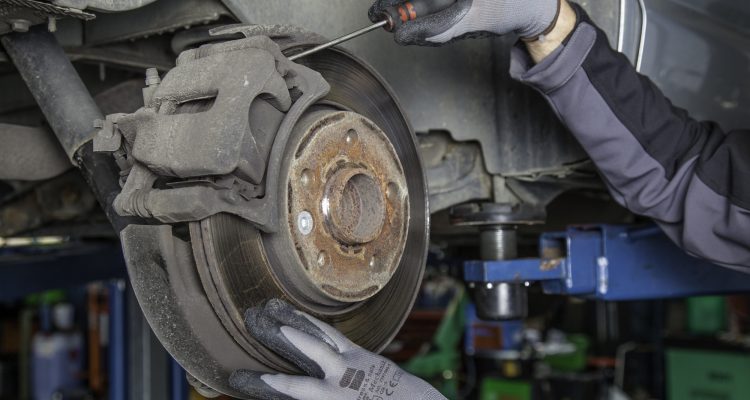
Roughly 22% of car accidents that are caused by some kind of vehicle problem or failure can be attributed to the brakes. The ability to bring a 4000+ pound vehicle to a stop is an extremely important part of driving.
Thus, keeping an eye on your brakes is very important. Whenever you suspect a problem with the brakes you should take it in so that a car repair professional can inspect your system.
But, you’re not a mechanic. How do you know when it’s necessary to take it in? Your car will let you know-if you know what to look for. Check out these common signs that you need new brake pads.
1. Vehicle “Pulls” When Braking
Sometimes brake pads can wear unevenly. In other words, the brake pad on one side of your car may wear out faster than the other.
Once the wear is uneven enough, the vehicle will begin to “pull” to one side or the other when you use the brakes. Left unchecked, the problem will worsen and can eventually become a safety hazard.
For this reason, take your vehicle in immediately if you notice this symptom. There are other things that may cause it, such as dirty brake fluid, a faulty brake caliper, or even uneven tire pressure. Regardless, there is an issue with something so your vehicle needs to be checked promptly.
2. Brake Fade
You may notice that it starts taking longer for your vehicle to stop than it used to. This is called brake fade. It can happen as a result of normal wear and tear.
This process can also be sped up significantly if you drive for long periods with your brakes depressed. For example, as you’re going downhill you may ride the brake. This will cause the brake pads and rotors to heat up. This reduces the friction between them and can cause brake fade.
If you live in a hilly area, it will be hard to avoid this phenomenon. You can help slow down the effects by learning to use engine compression to slow your vehicle rather than riding the brake as you go downhill.
3. Vibration in the Brake Pedal
Do you notice a weird vibration when you press on the brake pedal? This could be a serious issue with the brake pads.
Manufacturers use a binding resin to hold brake pads together. Under normal circumstances, this resin melts as the brake pad heats up and gets smeared evenly on the rotor.
If your brake pads get too hot, however, this resin may not be distributed evenly. This can cause the brake pedal to vibrate. A vibrating brake pedal can be a serious issue and is not something you should ignore. If you notice this problem, take your vehicle into a trusted mechanic as soon as possible.
4. A Squealing Sound
You should always be using your ears when you’re driving. This will help you pick up on engine or vehicle problems before they get to be super serious.
If you’re not an expert in vehicle noises, these sounds can be hard to differentiate. However, if you drive a vehicle day in and day out you will get used to its normal sounds. Anything out of the ordinary may indicate a problem.
In this case, you may notice a faint squealing or scraping sound. When you hit the brakes, the sound goes away, only to come back again when you take your foot off the brake.
This noise comes from a handy indicator that many brake pad manufacturers include on their brake pads. This comes in the form of a little metal tab near the top of the brake pad.
Once your brake pad wears down to a certain extent, this tab will begin to scrape against the rotor and create the noise.
5. A Clicking Sound
There are various methods for holding the brake pads in place. Some vehicles are outfitted with a special holding device for the pads. Others use simple pins, bolts, or clips. Regardless, the purpose is the keep the brake pads from moving around when you hit the brakes.
If the pads get loosened somehow, you’ll hear a clicking sound when you press and release the brakes.
6. A Loud Grinding Sound
By the time your vehicle gets to this sound, it’s probably already worked its way through the other sounds and you weren’t paying close enough attention. Now the problem is pretty severe.
This sound starts happening when the brake pads are completely worn away. Without the padding effect of the brake pads, the disc and the caliper (two metal parts) are grinding directly against one another.
If you keep driving your vehicle and using the brakes like this, you’re going to have to replace more than just the brake pads. In fact, you may have already scored (scratched) the rotors and they will need to be either turned or replaced completely.
Do You Need New Brake Pads?
What do you think? How does your vehicle stack up? If you don’t notice any of these issues, hooray! You most likely don’t have any issues with your brake pads.
However, if you have noticed one or more of these problems, you should take your car into a reputable mechanic as soon as possible. Brakes are a very important part of the safety system of your vehicle. If there is one thing you don’t want to be stuck without, it’s your brakes. New brake pads are not nearly as expensive as what you could end up paying if you are in an accident that could have been avoided by properly maintaining your car.
To check out more helpful tips for vehicle repair, feel free to browse through the other posts on our blog. We’ve got all sorts of information to help you keep your vehicle purring like a kitten all the time!